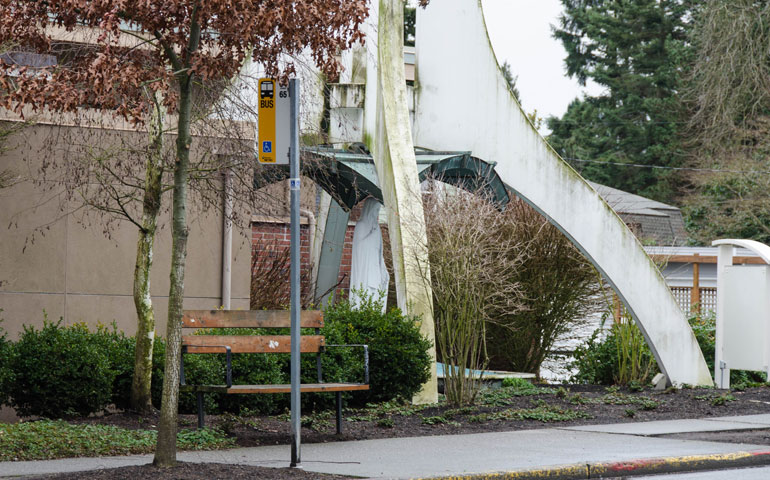
The bus stop by Our Lady of the Lake Parish in Seattle (Andrew Carr)
In Fr. Tim Clark's designated parking spot, a small trailer set up shop, at his urging, from Feb. 5-26. Its contents -- blankets, camping-style mats, hygiene kits, and cleaning supplies, among other items -- belong to Seattle's Union Gospel Mission, a faith-based social-service provider in Washington state that launched this winter a rotating "volunteer-run satellite shelter" aimed at providing a refuge for homeless people who choose to remain in their neighborhoods rather than seek out large dormitory-style shelters downtown.
In partnership with three other churches of various faith denominations in North Seattle, it's now Our Lady of the Lake Parish's turn to convert three months of preparations, as well as the lower level of a parish office, into a safe and smoothly running evening-only emergency shelter. First proposed for consideration by the parish's Justice and Peace Committee, church leadership approved the idea to join in this ecumenical effort and more than 100 parish and parish school families embraced the decision in their responses to Deacon Roy Harrington's initial announcement.
Other Catholic churches in the area, often through association with Catholic Community Services, have established a tradition of outreach to the poor and homeless. Seattle's St. Martin de Porres Shelter for older men, for instance, counts on eight local churches, including St. James Cathedral, for volunteer support and space during the colder months of the year. At Our Lady of the Lake, ministry to this particular population has been a step-by-step process, inspired both by internal and external influences over time.
Decades before, the parish offered a small house (no longer standing) on church property for certain lengths of time to struggling refugee and single-parent families. As Clark explained, "Consistently, members of this Catholic community have manifested an impassioned outreach toward the marginalized and the poor: from their work with Hmong refugees and their weekly presence at St. Francis House in Seattle [an independent nonprofit that serves the needy in local communities through clothing, household items, and furniture collection and distribution at no charge], to more global issues, all as a response to the Gospel and church teaching. To borrow a line from our mission statement, they express a 'desire to be the hands, feet, and heart of Christ, Wellspring of justice and mercy' in ways that inspire and humble me."
Plans for a shelter to accommodate 12-15 men and women were soon under way. An ordinance passed unanimously by the Seattle City Council in 2011 granted religious facilities increased freedom to enter into hosting arrangements with encampment operators as long as they uphold good neighbor rules; prohibitions on alcohol, drugs and weapons; sex offender checks; rules for children within the encampment; and public health and safety standards. Michael Palmer, the parish administrator, said he began "a process of weaving my way through the city, the city's building department, and the permitting process." The parish also painstakingly followed archdiocesan policies. Later, subcommittees were formed to oversee phoning, supplies and meals, facilities and cleaning, and hosting and liaison duties. Church neighbors were sent personal letters related to the upcoming shelter.
Parishioners, assigned as co-hosts for approximately six-hour shifts (alongside two Union Gospel Mission employees responsible for reinforcing ground rules and screening guests), are instructed to stay awake at all times, and are relieved at midnight by fresh volunteers. This second shift includes responsibility for setting up an early breakfast, often eggs, pastries and fruit. The coffee supply is continually replenished, contributing the persistent scent of ground espresso beans to the makeshift kitchen and living room.
Those arriving or leaving follow a walkway lined with green shoots, signs of warmer weather to come. Along with newly installed lighting, steps are marked with neon paint to prevent stumbles at night. The backyard is fenced and mostly private, bordered by a scattering of homes and trees; a tent canopy is erected in one corner, offering a dry spot to smoke, chat or simply watch the rainfall.
But mostly people congregate indoors, where trays of cookies slowly, over hours, disappear. In a building that used to be a cloistered convent where the Dominican sisters of Tacoma resided while serving as educators at nearby parochial schools, rooms now scattered with mats and backpacks once served as an all-purpose space to wash and iron habits, watch "The Ed Sullivan Show," or engage in pingpong contests. Reflecting on the sisters' generations-old commitment to social justice teachings and the building's current role, Dominican Sr. Michele MacMillan, an early resident, rejoiced that "each part of the circle has come together to make up a whole."
Lorraine Hartmann, shelter coordinator for the parish, is reminded of a traditional Polish saying when describing her participation: "Gosc w dom, Bog w dom" ("Guest in house, God in house"). She says that this time of service "has brought into our community, through compassion, another face of God."
[Julie Gunter is a freelance journalist from Seattle and a member of Our Lady of the Lake Parish.]



